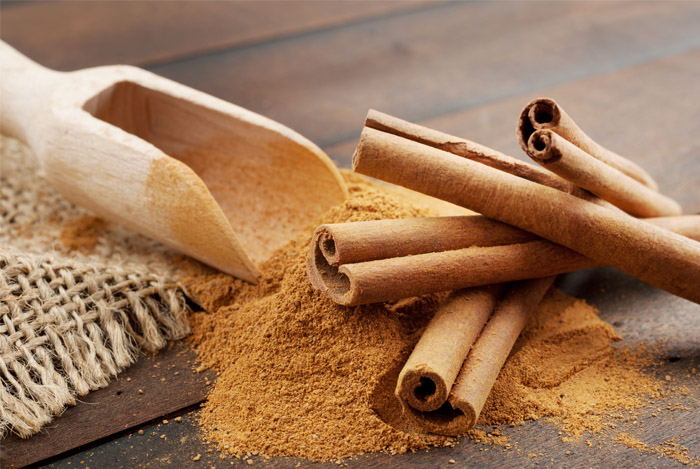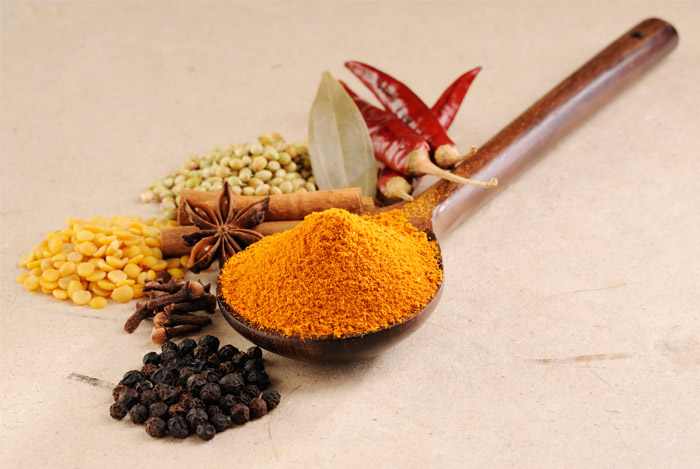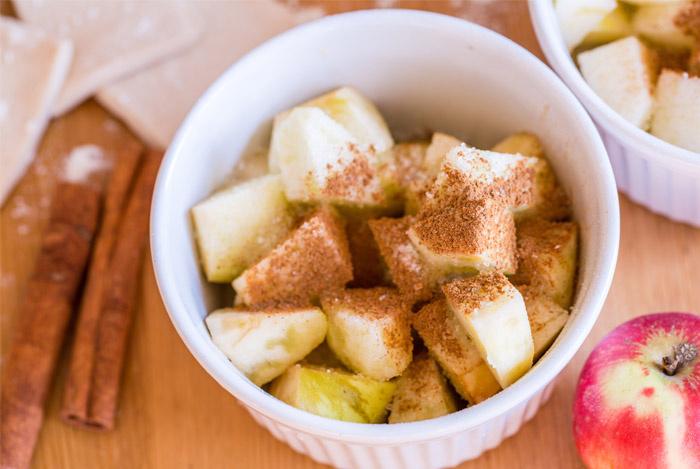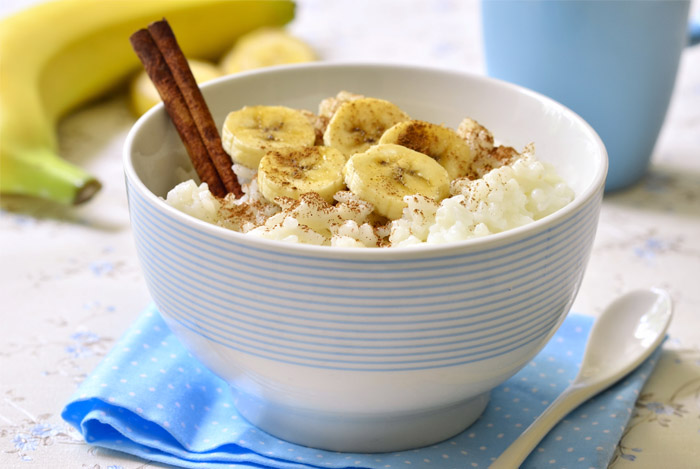Cinnamon is a real feel-good food. Even smelling it immediately makes me think of Fall, Thanksgiving and Christmas all at once.
Many of you might know cinnamon’s sweet and warm flavor best from Pumpkin Spice Lattes and warm apple pies, but it’s used for so much more than just sweet treats.
It has been consumed since 2000 BC in Ancient Egypt as a cure for a whole variety of illnesses. Medieval doctors prescribed it for coughs, sore throats and even arthritis.
While modern medicine may not believe in all of cinnamon’s supposed health benefits, more and more studies are showing this spice definitely has healing properties.
Check out what I’ve discovered about cinnamon through my research.
Nutritional Profile
 Before we get into cinnamon’s health benefits, check out its main nutritional offerings.
Before we get into cinnamon’s health benefits, check out its main nutritional offerings.
According to NutritionData.com one tablespoon contains:
- 19 calories
- 4 g fiber – 16% RDV
- Calcium – 8% RDV
- Iron – 4% RDV
- Manganese – 68% RDV
- No fat
- No cholesterol
While one tablespoon is probably too much, up to a teaspoon a day is a commonly recommended dose. Gram for gram, it still contains a high levels of nutrients when compared with other herbs and spices.
Now that we’ve seen some of the nutrients that cinnamon contains, let’s check out this super-spice’s health benefits.
A Rich Source of Manganese
 As you’ve seen, cinnamon is very high in manganese.
As you’ve seen, cinnamon is very high in manganese.
It’s estimated that as many as 37% of Americans don’t get enough of this important mineral in their diet.
That’s a pretty surprising statistic given that manganese can also be found in whole grains, nuts and seeds and leafy vegetables.
I guess it shows how many people choose refined grains and simple carbohydrates over the whole grain, complex carb variety!
Manganese helps our body metabolize fats and carbs, helps the thyroid gland function and produce sex hormones, regulates blood sugar levels and helps form connective tissue.
It’s also necessary for normal brain and nerve function.
Low levels of manganese in the body have been linked to infertility, bone malformation, weakness, and seizures.
A Cure for Fungal Infections
 The thought of fungus in our body is really gross isn’t it?
The thought of fungus in our body is really gross isn’t it?
Yet that’s exactly what causes athlete’s foot, jock itch, ring worm and yeast infections.
Fungus just loves to be in warm, moist areas of the body.
You can kill these freaky yeasts with over the counter or prescribed medications but it’s even better to help prevent these infections in the first place, or try cure them naturally.
Research studies have shown that cinnamon – or more specifically the chemical cinnamaldehyde found in cinnamon – has powerful antifungal properties.
Adding it to your diet may mean you’ll never again suffer those unpleasant itches again.
A 2012 Chinese study looked at the effect of cinnamon oil on candida albicans both in the laboratory and in patients suffering from intestinal candida.
In lab tests, the candida cells actually burst after being treated with cinnamon oil.
In patients who had candida, 14 days of treatment with a capsule containing both cinnamon oil and pogostemon oil, led to 72% being cured of candida. The remaining 28% had a significant reduction of candida cells in their stool.
Other studies (like this one and this one), have had similar results, proving that cinnamon is effective against fungal infections.
Anti-Bacterial
 It doesn’t just kill fungus, but bacteria too, making cinnamon a great spice to have in the kitchen.
It doesn’t just kill fungus, but bacteria too, making cinnamon a great spice to have in the kitchen.
Small amounts of cinnamon have been shown to kill both e-coli and salmonella bacteria.
And, a study on the antibacterial properties of cinnamon against five bacteria that are known to cause food to go off, found that cinnamon stick and its properties may work as an effective food preservative thanks to its ability to kill all five types of bacteria.
A Top Source of Antioxidants
 When compared with 25 other herbs and spices, cinnamon outranked them all in terms of antioxidant activity.
When compared with 25 other herbs and spices, cinnamon outranked them all in terms of antioxidant activity.
You might remember catechins as the powerful antioxidants behind green tea’s amazing health benefits. Well, they’re also present in cinnamon.
Studies have also seen that both cinnamon bark and cinnamon oil increase antioxidant levels in the bodies of rats.
Given that a diet rich in foods with high levels of antioxidants, like cinnamon, is associated with longevity and good health, we should always strive to eat more of these foods.
Cinnamon extracts also help prevent the oxidation of food, hence the term ‘antioxidant’. This means that, in addition to its anti-bacterial properties, it would make a great natural preservative.
The fact that it improves the flavor of the food doesn’t hurt either.
May Fight HIV
 HIV (human immunodeficiency virus) attacks the immune system, and makes the body more susceptible to infection.
HIV (human immunodeficiency virus) attacks the immune system, and makes the body more susceptible to infection.
If left untreated it may develop into AIDS. However, when HIV is diagnosed before it becomes AIDS, medicine can slow or stop the damage to the immune system.
The main type of HIV is HIV-1, which causes almost all of the cases of AIDS worldwide.
In a study of 69 Indian medicinal plants for anti-HIV activity, it was found that cinnamon bark is the most effective extract against HIV-1.
Another study found that compounds present in extracts of elderberry, cinnamon and green tea bind to and block HIV-1 infection in cells.
While I’m certainly not suggesting those diagnosed with HIV solely rely on cinnamon to treat the virus, it may be a useful complementary therapy – depending on what your doctor advises.
These studies also highlight the power of cinnamon’s medicinal properties.
Prevents Diabetes & Regulates Blood Sugar
 Insulin resistance is a condition where glucose builds up in the blood instead of being absorbed by our cells, leading to type 2 diabetes or metabolic syndrome.
Insulin resistance is a condition where glucose builds up in the blood instead of being absorbed by our cells, leading to type 2 diabetes or metabolic syndrome.
The polyphenols in cinnamon may help to reduce insulin resistance, helping to stave off diabetes.
What’s more, cinnamon and its components have beneficial effects on other factors associated with diabetes and metabolic syndrome, such as inflammation, blood pressure and body weight.
Cinnamon has even been shown to lower the levels of glucose that enter the blood after eating.
Another study of patients with type 2 diabetes found that cinnamon extract had a moderate effect in reducing fasting blood sugar levels, by up to 10.3%.
This sweet spice also mimics sweetness in foods, meaning that you may be able to cut down your sugar consumption just by adding a little to your latte or fruit bowl, which also helps blood sugar levels.
Appetite Suppressant
 Listed as ‘one of nature’s gastric bands’, cinnamon (along with eggs, lemons, green tea, water and sleep) can be a powerful appetite suppressant.
Listed as ‘one of nature’s gastric bands’, cinnamon (along with eggs, lemons, green tea, water and sleep) can be a powerful appetite suppressant.
A study published in the American Journal of Clinical Nutrition found that adding a small amount (6 g) of cinnamon to rice pudding slowed down the absorption of carbohydrates from the small intestine.
Because their stomachs didn’t empty as quickly as they would have without the cinnamon, participants felt fuller for longer.
Blood glucose levels and hunger are thought to be closely related, with high glucose levels causing an increased appetite. So, by stabilizing blood sugar, you’ll also reduce your appetite.
Improves Attention Span
 It turns out that most of us now have an attention span less than that of a goldfish.
It turns out that most of us now have an attention span less than that of a goldfish.
Eight seconds is about all we can manage before we lose concentration – a little crazy isn’t it?
Still with me?
So if you want to beat the super focused goldfish who can pay attention for a whole nine seconds, try a little cinnamon.
Simply smelling this spice has been shown to improve scores on tasks related to attention span, memory, and visual-motor response time, compared with the scent of jasmine, peppermint, or no fragrance at all.
Prevents Neurodegenerative Diseases
 Nobody wants to lose their memories, so protecting the brain against these types of progressive conditions is vital.
Nobody wants to lose their memories, so protecting the brain against these types of progressive conditions is vital.
The two most common types of neurodegenerative diseases are Alzheimer’s, which disrupts memory, thought and behavior; and Parkinson’s, which affects the way you move and causes tremors, stiffness and problems with balance.
In mice with Parkinson’s, consuming ground cinnamon had positive effects such as neuron protection, normalized levels of neurotransmitters, and improved motor functions.
Tel Aviv University researchers discovered that an extract found in cinnamon bark contains properties that inhibit the development of Alzheimer’s.
Unfortunately, it would take a toxic level of cinnamon to see these benefits, but scientists are still looking at a way to use cinnamon’s components to fight Alzheimer’s.
Contributes to Heart Health
 A diet rich in spices, including cinnamon and turmeric, have been shown to counteract some of the negative effects of eating a fatty meal.
A diet rich in spices, including cinnamon and turmeric, have been shown to counteract some of the negative effects of eating a fatty meal.
Normally, after eating such an unhealthy fat-filled meal, fat levels in your blood (known as triglycerides) rise. High triglycerides substantially raise the risk of heart disease.
In a very small study, participants added two tablespoons of spices, including cinnamon, to a fatty meal. The spices reduced triglyceride levels by about 30%!
They also raised blood antioxidant levels by 13%.
Now, I’m not saying you go out and eat an extra-cheesy pizza followed by an Oreo cheesecake and then have a spoonful of cinnamon, thinking all is forgiven.
But if you do happen to indulge, it’s something to keep in mind.
Kills Cancer Cells
 Cinnamon and cinnamon oil might be a powerful natural treatment to help block the development of cancer and tumors. It has been found effective against several cancers including:
Cinnamon and cinnamon oil might be a powerful natural treatment to help block the development of cancer and tumors. It has been found effective against several cancers including:
- In the treatment of gastric cancers and melanomas.
- Cervical cancer – it has been seen to cause these particular cancer cells to die.
- Colon cancer – mice with this cancer were shown to be protected against further cancer growth, when treated with cinnamon. Laboratory studies have also shown cinnamon protects against colon cancer in human colon cells.
Of course, far more studies are required and much more human testing, but initial tests do look promising for cinnamon’s role in cancer treatment.
A Multiple Sclerosis Therapy
 Multiple sclerosis (MS) is an often disabling disease of the central nervous system with no known cause.
Multiple sclerosis (MS) is an often disabling disease of the central nervous system with no known cause.
MS disrupts the flow of information within the brain, and between the brain and body.
Treatments are limited to medications and lifestyle modifications like stress management, a balanced diet and regular exercise.
In the future, there may be a place for cinnamon in a balanced MS treatment plan.
Initial findings of a study in mice with MS indicate that cinnamon may help those suffering from MS. Scientists are undertaking further study in this area.
If it shows similar effects in humans, it would be awesome news as cinnamon would be an inexpensive and natural therapy for sufferers.
Maintains Oral Health
 You might have noticed cinnamon is often used in chewing gum, mouthwash and toothpaste.
You might have noticed cinnamon is often used in chewing gum, mouthwash and toothpaste.
It may be partly because it tastes nice and suppresses the appetite, but it also helps oral hygiene.
The anti-bacterial properties of cinnamon play a role in ridding your mouth of harmful bacteria, making sure your teeth and gums stay in top health. It can also kill the bacteria that cause bad breath.
When the effects of both cinnamon oil and clove oil on the bacteria that cause dental caries was assessed, guess which one came out on top?
That’s right – cinnamon oil was found to be more effective than clove oil in maintaining a healthy mouth as it was a stronger anti-bacterial.
If you chew gum, make it a cinnamon gum. Researchers at the University of Illinois found that cinnamon-flavored chewing gum reduces bacteria in the mouth as it contains a compound found in cinnamon called cinnamic aldehyde.
Using Cinnamon in Meals
 Adding cinnamon to your diet is easy. Why not try:
Adding cinnamon to your diet is easy. Why not try:
- This ‘No Carb Banana Protein Pancake’ recipe
- A Banana Almond Smoothie with cinnamon
- Sliced, baked apples sprinkled with cinnamon for a lightened-up version of apple pie
- A high protein snack of roast chickpeas with cinnamon
- This Mediterranean-inspired quinoa and banana breakfast bowl
What do you think of cinnamon’s amazing health benefits?
The post 13 Science Backed Reasons You Should Eat More Cinnamon appeared first on Nutrition Secrets.
http://www.nutritionsecrets.com/eat-more-cinnamon/
No comments:
Post a Comment